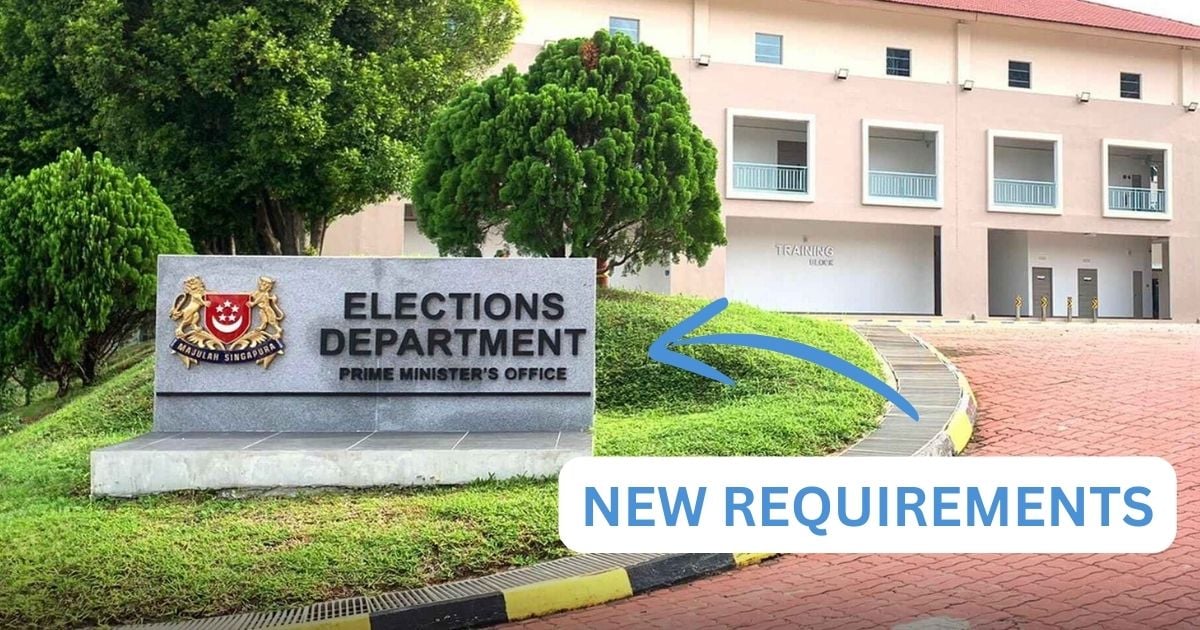In case you didn’t know, Singapore has a deadline for a general election (GE). Essentially, one needs to happen by November 2025.
But experts said that it could happen as early as September this year, following the Prime Minister handover in May.
Anyways, voting is compulsory. Watch this video and you’d understand:
As usual, we can be quite kiasu with our preparations, so the Elections Department Singapore shared some new advertising and election guidelines early.
Updated Parliamentary Elections Act 1954 (PEA) – Larger Area To Mark Your Choice
On 31 May 2024, the Elections Department announced that they had introduced some changes to the PEA to improve our elections – a larger area on the ballot paper for voters to mark their choice.
The statement said that the outlined changes and revisions, which were made in 2023, are expected to come into effect on 14 June 2024.
Apparently, these changes come as a response to feedback from the 2023 presidential election that some voters were unsure if they had marked their choice in the correct position.
Now there’s no excuse to say you don’t know.
As mentioned, the larger demarcated area on the ballot paper is only part of the revisions made to the PEA. There are updates to election advertising and overseas voting too.
New Election Advertising Requirements
The first change that was outlined in their statement is to the requirements in advertising.
You see, we can be quite proud of having a fairly transparent government compared to other countries.
Therefore, to enforce that, they require that all displayed election advertising contain the full names of everyone actively involved in the publishing or displaying of that ad.
That means the names of the person who wrote it, the person who checked it, the person who cleared it and the publisher (offline or online), have to be included in full.
They also said that there has to be a clear inclusion of the words “sponsored by” or “paid for by” if the ads are being paid, and it should include the full names of the sponsors, be it an individual or a company.
They said through these requirements, there would be greater transparency and accountability for what is communicated.
However, for us ordinary Singapore citizens who aren’t part of the political campaign or political party, and we’re not election agents, we can post online election posts on our own accord without adhering to these rules.
Of course, if you’re being paid by a political party to post on your Facebook, you need to make it clear on your post too.
We must also take note that the payments made include both “direct and indirect” forms, and can be “monetary and non-monetary”.
If I get one teh peng for one post, it’s better to just disclose.
That’s not all. If you boost old or existing election ads online, be it reposting, paying Instagram to up the view count or resharing, the ads need to be treated as though they are new.
In other words, they will be subjected to the new requirements even if they’ve been posted in the past.
The Powers of the Returning Officer
A Returning Officer (RO) is a public officer that was appointed by the Prime Minister to oversee the elections – make sure it’s running smoothly and without any shady business.
The ELD said that the RO has the power to ask any publisher, person and/or social media company to make changes to or take down the posted advertisement.
For online ads that langgar the election rules, the RO can do whatever they need (within reason) to:
- take down the ad,
- disable access to the ad (users in Singapore can’t see it anymore), and
- stop distribution or communication of the ads in Singapore
For offline ads, or traditional election advertising (TEA), political parties need to declare to the RO within 12 hours of the issuance of the Writ of Elections, all of the materials with the party symbols and party-affiliated symbols in them.
They can declare it online so that the public can see.
For those of you who don’t know what “Writ of Election” is, it refers to a public document that is issued by the President to mark the start of an election (kind of like the F1 flag at the start).
It’s also a no-no if you post any ads between the issue of the Writ and the start of the campaign without prior declaration unless the authorities clearly tell you in writing that you can.
Changes to Overseas Voting
To our fellow Singaporeans living overseas, the ballot papers that you fill out at overseas polling stations and via postal will be sorted by electoral divisions for counting.
So, instead of it being compiled at the national level as per the presidential election, it will be grouped according to, for example, Chua Chu Kang GRC or Sengkang GRC.
Also, each political party or independent candidate will be assigned a maximum of five counting agents. This is good news for our hardworking counting agents – they can maybe chill a bit.
Anyway, it makes sense, because there will be more candidates in the general election instead of the presidential election.
Last time, it was made such that one counting agent was assigned to 5,000 overseas voters.
The ELD added that there will be a new section in the Nomination Paper for election candidates to include their names so that it will appear on the printed ballot paper.
There will also be a new form for candidates to declare after the election that there were no foreigners or foreign influence involved in the conducting of any election activities
